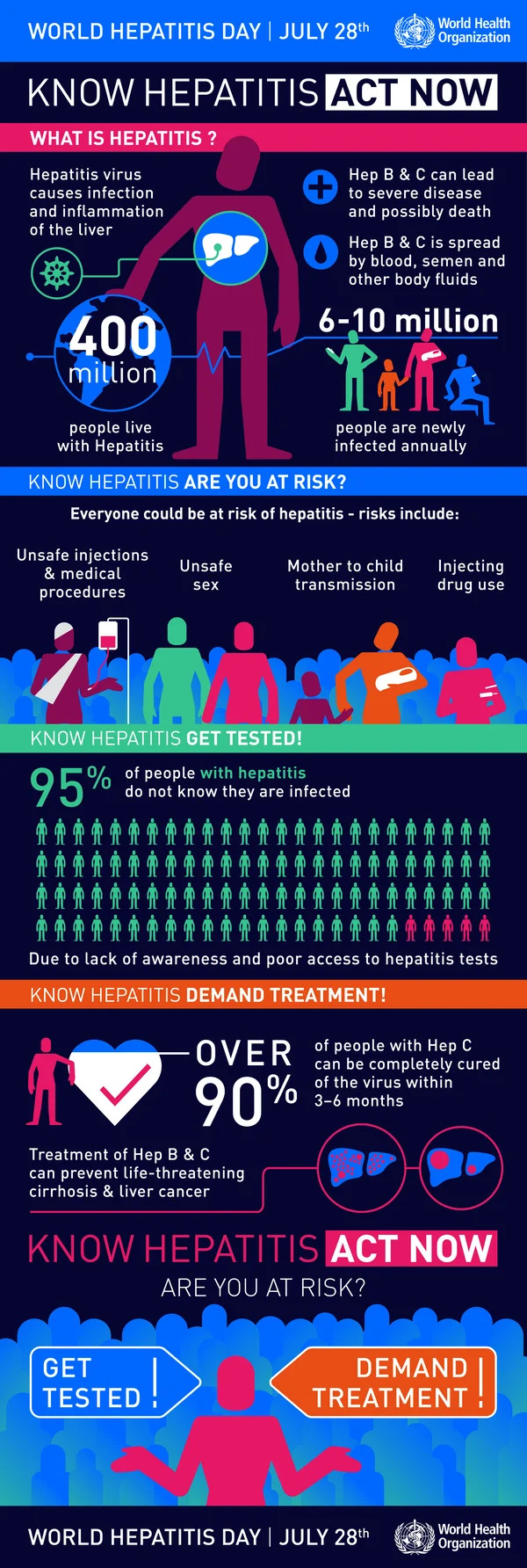Everything You Need to Know About Hepatitis
- Category: Health & Wellness
- Posted On:
- Written By: Apicha Community Health Center
World Hepatitis Day is July 28th. You've probably heard of hepatitis, but you may not know everything about it. In this blog, we're going to cover what you need to know.
Information for this blog is derived from the World Health Organization (WHO).
What is hepatitis?
Hepatitis is a virus that causes infection and inflammation of the liver. Around 400 million people currently live with the virus, and 6 to 10 million people are infected annually. However, 95 percent of people do not know they are infected.
There are five different variations of the Hepatitis virus. While B and C are the most common Hepatitis viruses, it is important to have knowledge of all of them.
- Hepatitis A virus (HAV) is present in the feces of exposed persons and is most often transmitted through consumption of contaminated water or food. Certain sex practices can also spread HAV. Infections are in many cases mild, with most people making a full recovery and remaining immune from further HAV infections. However, HAV infections can also be severe and life threatening. Most people in areas of the world with poor sanitation have been exposed to this virus. Safe and effective vaccines are available to prevent HAV.
- Hepatitis B virus (HBV) is transmitted through exposure to blood, semen, and other body fluids. It is considered to be a sexually transmitted infection. HBV can be transmitted from exposed mothers to infants at the time of birth or from a family member to infant in early childhood. Transmission may also occur through transfusions of HBV-contaminated blood and blood products, contaminated injections during medical procedures, and through injection drug use. HBV also poses a risk to health care workers who sustain accidental needle stick injuries while caring for HBV patients. Safe and effective vaccines are available to prevent HBV.
- Hepatitis C virus (HCV) is mostly transmitted through exposure to infective blood. This may happen through transfusions of HCV-contaminated blood and blood products, contaminated injections during medical procedures, and through injection drug use. Sexual transmission is also possible, but is much less common. There is no vaccine for HCV.
- Hepatitis D virus (HDV) infections occur only in those who are who already have HBV. The dual infection of HDV and HBV can result in a more serious disease and worse outcome. Hepatitis B vaccines provide protection from HDV infection.
- Hepatitis E virus (HEV) is mostly transmitted through consumption of contaminated water or food. HEV is a common cause of hepatitis outbreaks in developing parts of the world and is increasingly recognized as an important cause of disease in developed countries. Safe and effective vaccines to prevent HEV infection have been developed but are not widely available.
What are Hepatitis symptoms?
Often times individuals with hepatitis experience no symptoms. Although each strain of the virus may have its own specific symptoms, the following may be present in those who have been exposed. If you think you have hepatitis, contact your medical provider to get tested as soon as possible.
- Yellow skin or eyes (jaundice)
- Nausea
- Abdominal pain
- Fatigue
- Fever
What can I do on World Hepatitis Day?
- Get tested. Go to your nearest testing center and have them test you for Hepatitis B and C. Apicha Community Health Center provides testing for hepatitis.
- Get vaccinated. The Hepatitis B vaccination was probably provided to you as a baby or toddler when you received your initial vaccinations. However, you probably haven't received vaccinations regarding the other three forms of the virus, so read the description of each one above and determine if you may be at risk of contracting any of the other forms. For example, if you are traveling to a country with poor sanitation practices, you will want to get vaccinated for Hep A.
- Get the treatment you need. As you can see from the infographic below, Hepatitis C can be completely cured within 3-6 months in 90% of people who receive the correct treatment. So make sure that you sign up to receive primary care from a health care facility that has the means to provide this treatment for you.
- Share to increase awareness. Whether you have been infected with the Hepatitis virus or not, share all the knowledge you have about this infection with your friends. Encourage them to get tested and to get their vaccines if they haven't yet. One more vaccinated person equals one less person infected with the hepatitis virus, and one step closer to bringing an end to the spread of the virus.

